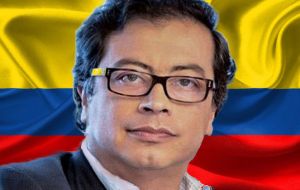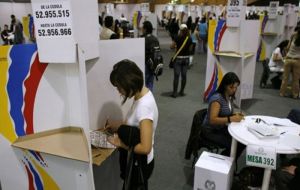MercoPress. South Atlantic News Agency
Colombian election: clear cut right and left candidates will dispute the 17 June runoff
 A favorite from the start, Uribe’s protégé Ivan Duque, as expected managed the highest number of supporters, with over 7 million, or 39% of the votes.
A favorite from the start, Uribe’s protégé Ivan Duque, as expected managed the highest number of supporters, with over 7 million, or 39% of the votes.  Gustavo Petro, who is promising social reform and to close the “gap” between the rich and the poor, picked 25% of votes cast
Gustavo Petro, who is promising social reform and to close the “gap” between the rich and the poor, picked 25% of votes cast  Over 19 million Colombians turned out to the ballot box, the highest turnout in 20 years. It was also the most peaceful and incident free election in half a century.
Over 19 million Colombians turned out to the ballot box, the highest turnout in 20 years. It was also the most peaceful and incident free election in half a century. Colombia’s left and right will be holding a runoff to compete for the presidency in June after hard-line conservative Ivan Duque and ex-guerrilla Gustavo Petro scooped most of the votes in the first round of Sunday elections.<br />
The second vote will take place on June 17, which could see Colombia's already fragile peace deal with the FARC guerrillas shaken.
Bogota mayor Petro is a strong supporter of the agreement which saw the country’s biggest rebel group put down their weapons to form a political party. At the other extreme of what is now called “the gap”, in South American political terms, stands Ivan Duque, protégé of popular hard line ex-president Alvaro Uribe, who insists in amending the deal.
In the first round of the presidential elections since the 2016 peace agreement, over 19 million Colombians turned out to the ballot box – the highest turnout in 20 years. It was also the most peaceful and incident free election in half a century.
A favorite from the start, Uribe’s right-hand man, Duque, expectedly managed the highest number of supporters, with over 7 million, or 39% of the votes.
Petro, who is promising social reform and to close the gap between the rich and the poor in one of the region’s most unequal nation, shocked analysts by picking up 25% of votes in a traditionally right-wing country.
Colombia’s first round of voting also saw centrist – and hugely popular – candidate Sergio Fajardo eliminated from the race with over 4.8 million votes (23.7%).
The mathematician did surprisingly well, trailing very closely behind Petro and beating all candidates in Bogotá. Germán Vargas, the center-right favorite of current president Juan Manuel Santos, was knocked out with just 7% of the popular vote.
And former vice-president and the man who negotiated the 2016 peace deal with the FARC, Humberto de la Calle, left the race with just little over 2%.
This year’s elections are seen as particularly important as former rebel group the FARC – known for wreaking havoc on the country in the half-century civil war – were given the chance to form a political party following the peace deal which led them to give up their weapons.
Their party had little success in the legislative elections in March though the hottest topic now is how to deal with FARC commanders who many believe should be locked up, rather than having a place in politics. Many Colombians aren’t keen on the deal and the next president could potentially change the some of the terms.
Voters on June 17 will determine if despite improved security conditions during the last decade, who is the best man to deal with a proliferation of armed groups filling the vacuum left by the FARC, an unprecedented cocaine production and rampant corruption at all levels. This besides having to deal with the huge influx of Venezuela refugees fleeing their country's economic collapse, over 1.5 million and straining the already scarce resources of Colombia for such a gigantic challenge.




Top Comments
Disclaimer & comment rulesCommenting for this story is now closed.
If you have a Facebook account, become a fan and comment on our Facebook Page!